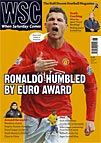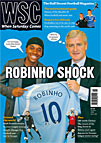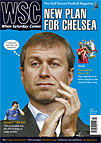What are the expectations for the team?
After being drawn in a group containing both 2006 World Cup finalists, the expectations are not high, especially after some shaky qualifying performances, such as a single-goal victory over Luxembourg and a collapse against Belarus in Minsk at the end of 2007. However, the national team have survived the first round of every European Championship since Marco van Basten, Ruud Gullit and Co won the title in 1988 so there is always the possibility of another penalty shootout defeat in the quarter- or semifinals.
Have any players appeared in commercials or any other adverts?
Edwin van der Sar features in a commercial for healthy mints, in which he stops penalties taken by Bad Breath, Tooth Slice and Coffee Stain. The revenues may go to a good cause.
Is the coach popular?
Not really. Van Basten’s preference for Ajax reserves is suspect, while the way he stubbornly clung on to the two-winger system when there wasn’t a recognised one in the squad was a bit strange – but players have recently talked him out of that. However, every Dutch national coach suffers from the nation’s expectation of being entertained. Winning is not good enough, we want “dream football”, too.
Are there any players with unusual hobbies or business interests?
Clarence Seedorf is the owner of a 125cc Moto GP team. He has also founded the Clarence Seedorf Stadium in Paramaribo and aims to lead Surinam to the World Cup. The Netherlands Antilles also hope to dip into the talent pool of black players in the Eredivisie, which may affect the Dutch national team in the future.
What will the media coverage be like?
There is a tendency to use coaches as pundits. “This would never happen against any team of mine” is always a subtext of their comments. Louis van Gaal quit during the qualifying tournament, saying he had pointed out the same mistakes in the team tactics over and over again and felt he was repeating himself. However, it is very difficult for Van Gaal to keep his opinions to himself, so when asked, he will surely turn up somewhere on the telly. As will Johan Cruyff who was simultaneously a TV pundit and an advisor to Van Basten during the 2006 World Cup. After the bad-tempered loss to Portugal in the last 16, Cruyff defended Van Basten in his newspaper column the next day and blamed the defeat on government minister Rita Verdonk, who had refused to give Salomon Kalou a Dutch passport.
Will there be many fans travelling to the tournament?
Most Dutch tickets are taken by sponsors, the biggest one an insurance company, who use them to reward their agents and employees. It is a new form of hooliganism. At the 2006 World Cup there were frightening stories of unsuspecting foreign fans isolated in pub corners by men dressed in orange who bombarded them with stories about life insurance, investment plans and favourable loan rates.
Ernst Bouwes
 Jonathan Wilson reports on the region of Serbia that may have produced a golden generation
Jonathan Wilson reports on the region of Serbia that may have produced a golden generation

